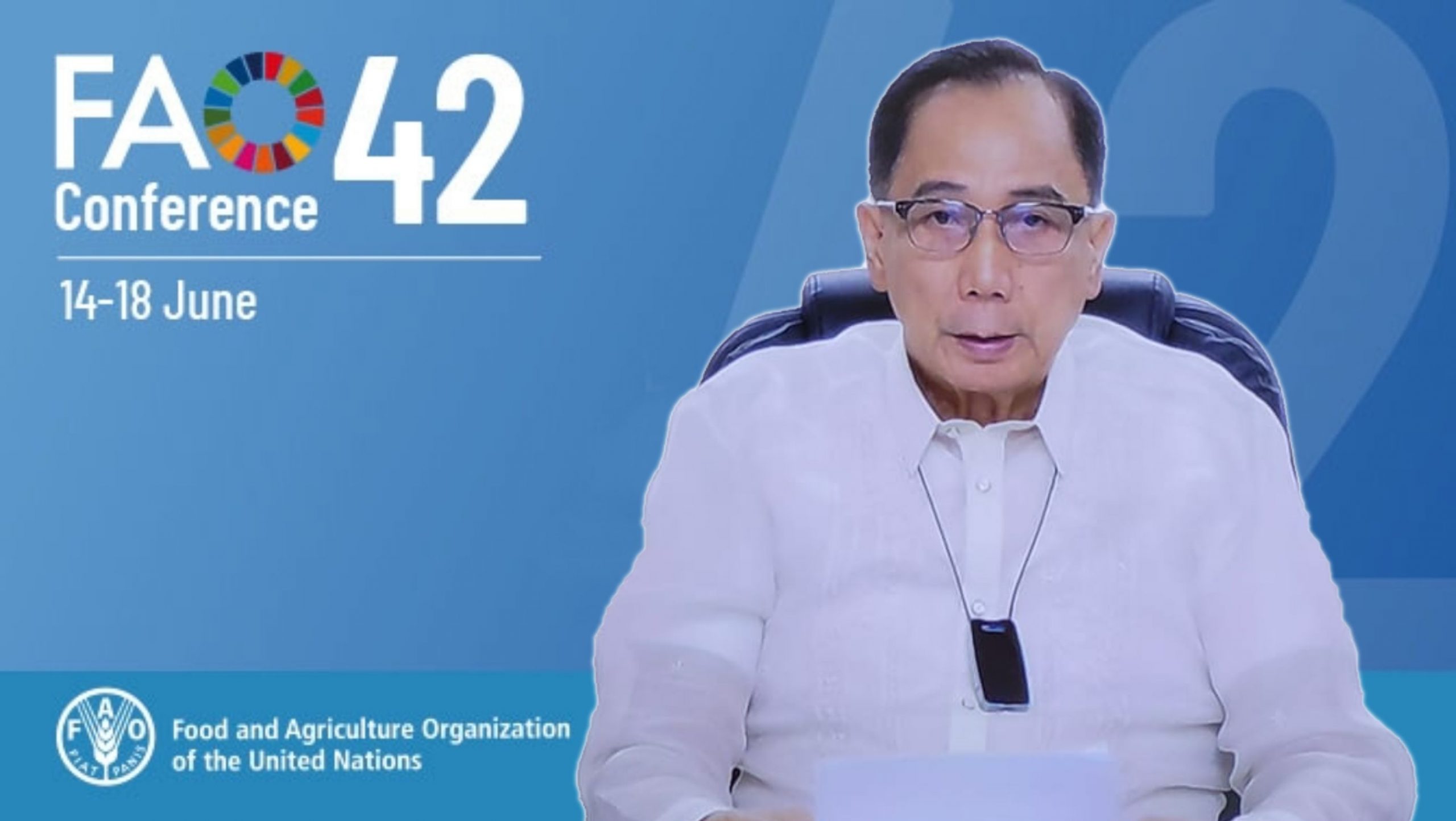
Agriculture Secretary William Dar calls for greater international cooperation to ensure that science-driven innovations and technologies are institutionalized in the agriculture sector to mitigate the adverse impacts of climate change, and end hunger by 2030, among other United Nation’s Sustainable Development Goals (SDGs).
“It is important that international pooling of knowledge, science and technology, and new innovations are further encouraged, and that their benefits should extend to all sectors and stakeholders across all nations,” said Secretary Dar, at the June 15 virtual discussion on “Combating Climate Change and Hunger through Innovation,” as part of the 42nd Session of the UN-Food and Agriculture Organization (FAO) Conference.
He noted that the world is now at a moment in history where technology and globalization are changing the dynamics of economic progress.
“Because of the complexities brought about by climate change and its impact on food systems, as well as the new normal brought about by the COVID-19 pandemic, we should ensure that the benefits of science-driven innovation find a place in our farms as well as in the homes of every rural family and ultimately, in every home in all societies,” he added at the virtual FAO session, attended by more than 1,300 participants around the world – including 117 agriculture ministers and vice ministers.
“We believe that we have here and now an excellent opportunity to reboot and foster together hope, trust, and mutual understanding that are essential for all citizens of the world to survive and prosper,” he said.
Billionaire philantrophist Bill Gates also attended the event to deliver the “McDougall Memorial Lecture,” in honor of Frank Lidgett McDougall, an Australian agriculture expert, who was instrumental in creating FAO.
Gates emphasized the need to help smallholder farmers, especially in low-income countries, invest in results-oriented, climate-resilient agriculture to achieve the SDGs and avoid a “catastrophic economic crash.”
“Smallholder farmers are accustomed to overcoming incredible adversity and are constantly innovating based on changing weather and market demands… But they can’t solve this alone,” he said.
The UN SDG 2 calls for ending hunger by 2030 and doubling of income and productivity of smallscale food producers.
To make such ambitious targets meaningful, Gates said better data is needed to measure progress. The Bill and Melinda Gates Foundation is supporting FAO’s statistical work to fill data gaps.
The FAO event gave Secretary Dar the opportunity to reconnect with Gates, whose Foundation donated in 2013 $21 million to the International Crops Research Institute for the Semi-Arid Tropics (ICRISAT) and two other agricultural research centers for a tropical legumes project, aimed at helping 60 million small farmers in India and 14 other countries in South Asia and sub-Saharan Africa. Dar led ICRISAT as director-general, from 2000 to 2014.
In response to Gate’s challenge, Secretary Dar said the Philippine government is continuously encouraging stronger private sector investments and partnerships to attain sustainable agricultural modernization and industrialization, equitable prosperity, and national food security.
“Agriculture is the mainspring of rural economic progress in the Philippines, and its development is key to addressing the bigger part of our continuing problem of poverty,” Secretary Dar said.
“We employ modern technologies and innovations in our ongoing efforts to revitalize productivity and increase incomes of Filipino farmers and fishers, and mitigate the impact of climate change on food security,” he added.
For his part, FAO Director-General Dr. Qu Dongyu said that the global community is now facing multiple challenges — from conflicts, climate extremes, and economic downturns, which undermine efforts to end hunger, food insecurity, and inequalities.
To end hunger by 2030, he said world leaders and stakeholders must act holistically and perceive the challenges they face through an agri-food systems lens, particularly by opening the door to the world of digital agriculture.
“The future of agriculture needs to be built on science, innovations and digital applications, that can produce significant gains in terms of increased efficiency, facilitate the good functioning of supply chains, and enhance sustainability,” he added. ### (DA StratComms)














